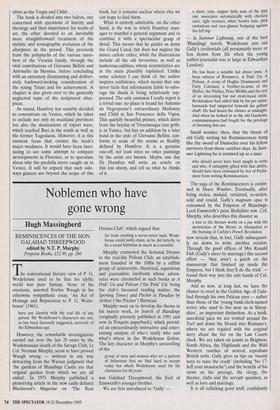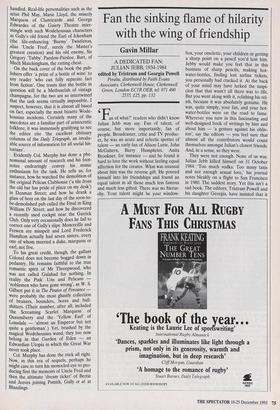Noblemen who have gone wrong
Hugh Massingberd
REMINISCENCES OF THE HON. GALAHAD THREEPWOOD edited by N.T. P. Murphy Porpoise Books, f12.99, pp. 266 The conventional literary view of P. G. Wodehouse used to be that his idyllic world was pure fantasy. None of his creations, asserted Evelyn Waugh in his otherwise sympathetic essay, 'An Act of Homage and Reparation to P. G. Wode- house' (1961),
have any identity with the real life of any period. Mr Wodehouse's characters are not, as has been fatuously suggested, survivals of the Edwardian age.
However, the remarkable investigations carried out over the last 20 years by the Wodehousian sleuth of the Savage Club, Lt Col. Norman Murphy, seem to have proved Waugh wrong — without in any way detracting from the Wavian judgment that `the gardens of Blandings Castle are that original garden from which we are all exiled'. In 1975 Murphy published a pioneering article in the now sadly defunct Blackwood's Magazine on 'The Real far from creating a never-never land, Wode- house could justly claim, as he did latterly, to be a social historian as much as a novelist.
Murphy connected the fictional Drones to the real-life Pelican Club, an establish- ment founded in the 1880s by a raffish group of aristocratic, theatrical, equestrian and journalistic layabouts whose adven- tures were chronicled in such books as A Pink' Un and Pelican (`the Pink' Un' being the club's favoured reading matter, the Sporting Times) and Pitcher in Paradise by Arthur (`the Pitcher') Binstead.
Murphy went on to develop the theme in his master work, In Search of Blandings (originally privately published in 1981 and now in Penguin paperback), which provid- ed an extraordinarily instructive and enter- taining analysis of who's really who and what's where in the Wodehouse fiction. The key character in Murphy's unravelling of the
group of men and women who set a pattern of behaviour that we find hard to accept today but which Wodehouse used for his characters for 60 years was Galahad Threepwood, the Earl of Emsworth's younger brother.
We are first introduced to 'Gaily' — a short, trim, dapper little man of the type one associates automatically with checked suits, tight trousers, white bowler hats, pink carnations and race-glasses bumping against the left hip
— in Summer Lightning, one of the best `Blandings' novels. Wodehouse sets out Gally's credentials (all presumably more or less drawn from life when the young author-journalist was at large in Edwardian London):
He has been a notable lad about town, A beau sabreur of Romano's. A Pink' Un. A Pelican. A crony of Hughie Drummond and Fatty Coleman; a brother-in-arms of the Shifter, the Pitcher, Peter Blobbs and the rest of an interesting but not strait-laced circle. Bookmakers had called him by his pet name, barmaids had simpered beneath his gallant chaff. He had heard the chimes at midnight. And when he looked in at the old Gardenia, commissionaires had fought for the privilege of throwing him out.
Small wonder, then, that the threat of old Gaily writing his Reminiscences hung like the sword of Damocles over his fellow survivors from those carefree days. In Sum- mer Lightning he is summed up as a man
who should never have been taught to write and who, if unhappily gifted with that ability, should have been restrained by Act of Parlia- ment from writing Reminiscences.
The saga of the Reminiscences is contin- ued in Heavy Weather. Eventually, after being stolen, mislaid, retrieved, re-stolen, sold and resold, Gally's magnum opus is consumed by the Empress of Blandings, Lord Emsworth's prize Berkshire sow. Col. Murphy, who describes this disaster as a loss to the literary world on a par with the
destruction of the library at Alexandria or the burning of Carlyle's French Revolution, now reveals that, in fact, Gaily subsequent- ly sat down to write another .version. Through the good offices of Mrs Ronald Fish (Gally's niece by marriage) this second effort — 'they aren't a patch on the manuscript that finished up inside the Empress, but I think they'll do the trick' found their way into the safe hands of Col. Murphy.
And so now, at long last, we have the chance to revel in the Golden Age of Gala- had through his own Pelican eyes — rather than those of the 'young bank-clerk-turned writer who used to live near us in Shrop- shire', an important distinction. At a brisk, anecdotal pace we are trotted around the Turf and down the Strand into Romano's, where we are regaled with the original story about the bet on the Law Courts clock. We are taken on jaunts to Brighton, South Africa, the Highlands and the Wild Western ranches of several reprobate British nobs. Gaily gives us tips on 'twenty ways to raise the ready' (including 'No 17: Sell your moustache') and the benefit of his views on the peerage, the clergy, the theatre, clubs and the servant question, as well as love and marriage.
It is all rollicking good stuff, confidently handled. Real-life personalities such as the artist Phil May, Marie Lloyd, the miserly Marquess of Clanricarde and George Edwardes of the Gaiety Theatre inter- mingle with such Wodehousian characters as Gally's old friend the Earl of Ickenham (the life-enhancing 'Barmy' Twistleton, alias 'Uncle Fred', surely the Master's greatest creation) and his old enemy, Sir Gregory 'Tubby' Parslow-Parsloe, Bart, of Much Matchingham, the ratting cheat. On the back cover of the book the pub- lishers offer 'a prize of a bottle of wine' to any reader 'who can fully separate fact from fiction'. One trusts that the bottle in question will be a Methuselah of vintage champagne, for the two are so intertwined that the task seems virtually impossible. I suspect, however, that it is almost all based on fact, especially the most bizarre Wode- housian incidents. Certainly many of the anecdotes are a familiar part of aristocratic folklore; it was immensely gratifying to see the editor cite 'the excellent obituary columns of the Daily Telegraph, an invalu- able source of information for all social his- torians'.
Evidently Col. Murphy has done a phe- nomenal amount of research and his foot- notes endearingly convey his manic enthusiasm for the task. He tells us, for instance, how he watched the demolition of the original Pelican Clubhouse Ca tile from the old bar has pride of place on my desk') in Denman Street; and how he drank a glass of beer on the last day of the soon-to- be-demolished pub called the Final in King William IV Street; and how he discovered a recently used cockpit near the Garrick Club. Only very occasionally does he fail to correct one of Gally's slips: Moncreiffe and Frewen are misspelt and Lord Frederick Hamilton actually had seven sisters, every one of whom married a duke, marquess or earl, not five.
To his great credit, though, the gallant Colonel does not become bogged down in pedantry. He remains faithful to the true romantic spirit of Mr Threepwood, who was not called Galahad for nothing. In reality the Pink' Uns and Pelicans `noblemen who have gone wrong', as W. S. Gilbert put it in The Pirates of Penzance were probably the most ghastly collection of bruisers, bounders, bores and bull- shitters. (Their number, after all, included `the Screaming Scarlet Marquess' of Queensberry and the 'Yellow Earl' of Lonsdale — 'almost an Emperor but not quite a gentleman'.) Yet, brushed by the magical Wodehousian wand, they too now belong in that Garden of Eden — an Edwardian Utopia in which the Great War never took place. Col. Murphy has done the trick all right. Now, in this era of sequels, perhaps he might care to turn his monocled eye to pro- ducing first the memoirs of Uncle Fred and then the ultimate 'dream ticket' of Bertie and Jeeves joining Psmith, Gaily et al at Blandings.











































































































 Previous page
Previous page